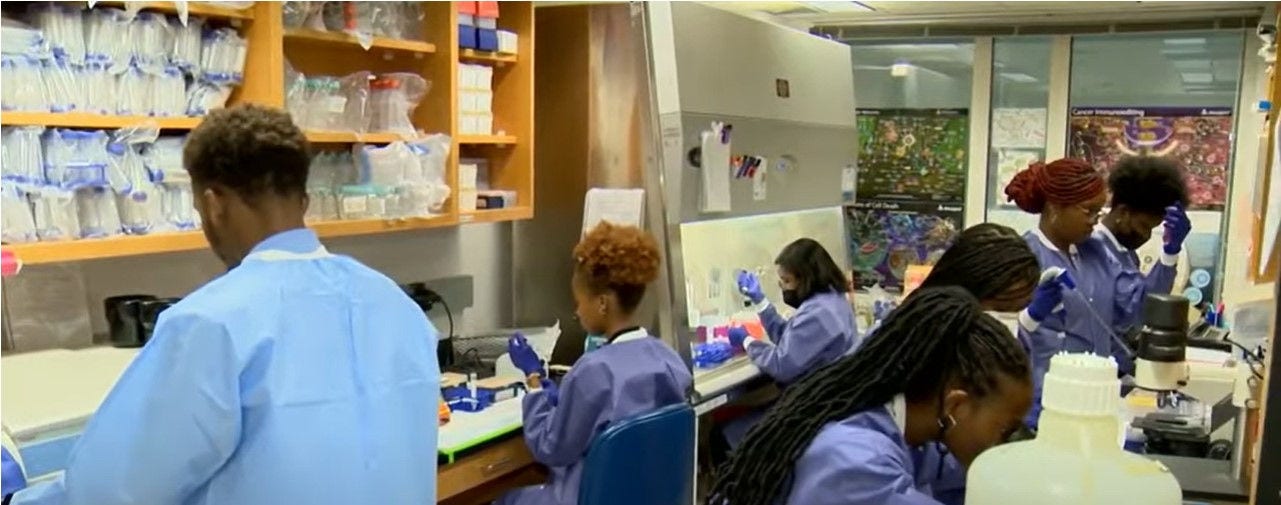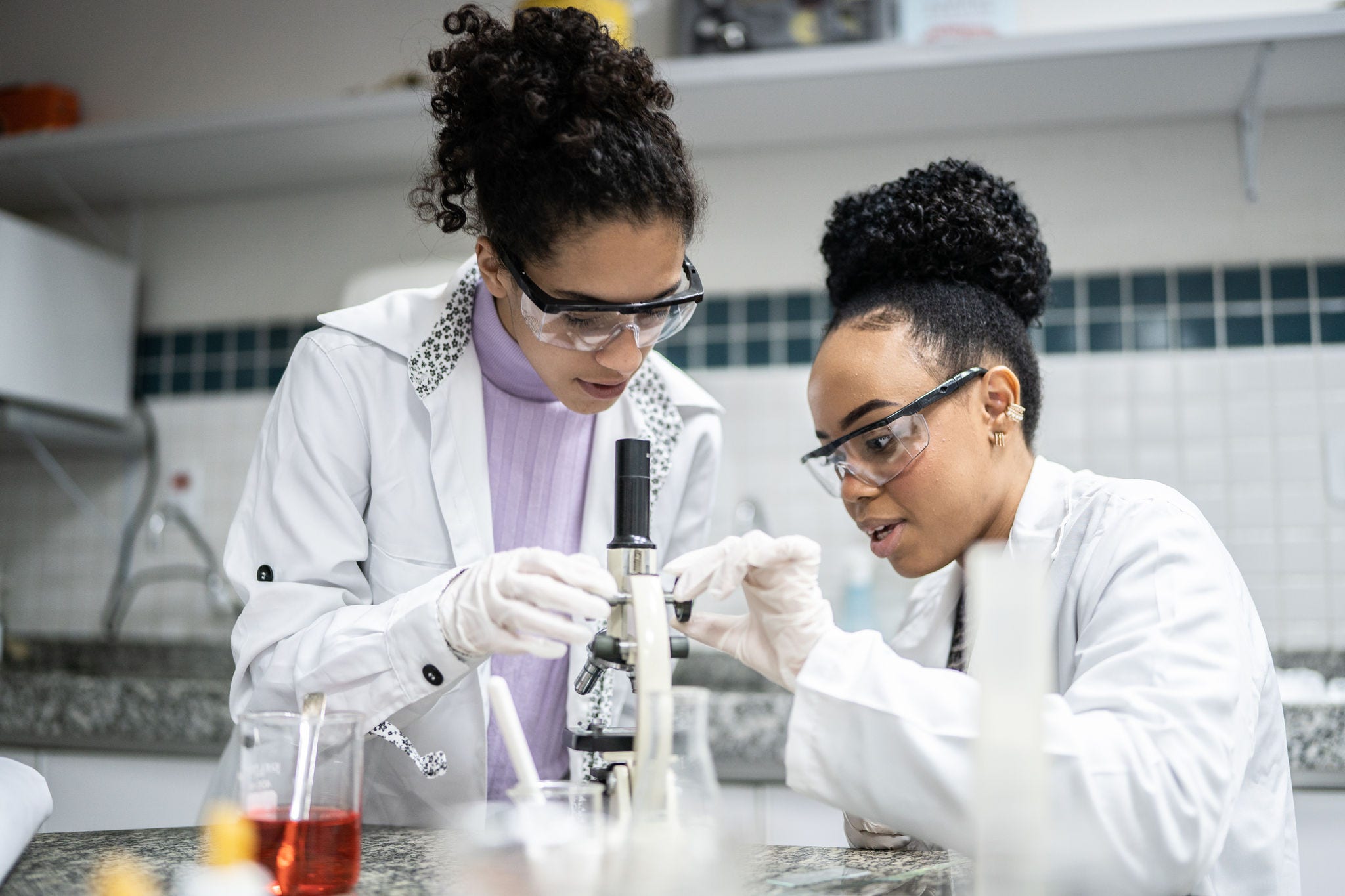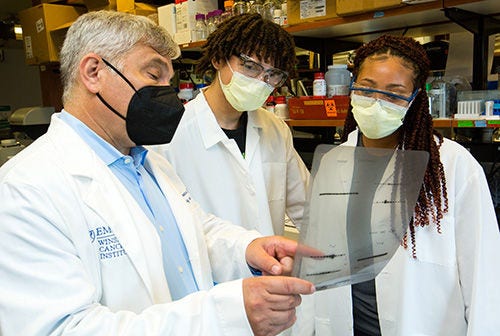ACS Center for Diversity in Cancer Research (DICR) Training
We aim to increase diversity and inclusion in the cancer workforce by providing training and support to students from groups that are underrepresented in the science and health professions because of race, ethnicity, gender, disability status, and/or because of having a disadvantaged background.
ACS is changing students' career paths in Baltimore through their Diversity in Cancer Research Internship.
More Diversity in Researchers May Help Decrease Disparities
New Center for DICR Training funds hands-on research programs for student populations who are under-represented in the cancer workforce.
Diverse voices are critical in improving inequities in cancer prevention, treatment, and care. Unfortunately, the communities that bear a disproportionate burden of cancer continue to be underrepresented in the cancer research workforce. To build an inclusive research community that more effectively addresses cancer disparities requires increased efforts to recruit and nurture people who are under-represented in the scientific and clinical training environments. That's why the American Cancer Society (ACS) has established the Center for Diversity in Cancer Research (DICR) Training.
The center allows the ACS to have an even greater impact on filling the gap in funding cancer research and on helping the next generation of cancer researchers more fully represent all populations.
"Our new, sustainable center establishes ACS as a leader in capacity building for diversity, equity, and inclusion in cancer research," says the Center's Senior Vice President Ellie Daniels, MD, MPH.
The ACS DICR Training Center recruits young adults who are part of populations that have been established as underrepresented in the health-related science workforce in the United States including:
- Certain racial and ethnic groups
- People from low socioeconomic or disadvantaged backgrounds
- Women
- People with disabilities
There are 3 programs (see boxes below to learn more):
- Summer HealthCare Experience (SHE) for high school females
- Diversity in Cancer (DICR) Internship for undergraduates
- Post-Baccalaureate Program for graduates planning to get a doctoral degree
By funding budding scientists in programs that offer virtual or hands-on mentored research experience as well as career development, the Center aims to increase students' awareness of, and enthusiasm for, opportunities to work in cancer research.
The programs also focus on providing support to help students overcome barriers that may hinder their success—whether academic, financial, or social—and on strengthening skills that improve their competitiveness for a career in cancer research or care.
Training programs that bring more diversity into cancer research help the ACS build capacity toward our mission to ensure everyone has an opportunity to prevent, detect, treat, and survive cancer.
"Working to remove the academic barriers people of color and others face allows us to grow a pipeline of applicants for positions in cancer research who are well-qualified and who have a unique connection to the communities we need to impact," Daniels says.
With programs for high school and college students, as well as college graduates, the ACS DICR Training Center is designed to make a dramatic change in the makeup of cancer research scientists—and that should lead to improved scientific output.
"The immersive trainee experience in our Center's programs will create a platform for longstanding relationships between the ACS, program participants, and partner institutions," Daniels says.
Why Diversity in Cancer Research Is Needed
Diversity in science is critical because it invigorates problem-solving, drives innovation, and better equips the scientific community to address inequities that exist in cancer prevention, treatment, and care.
The lack of diversity within the scientific workforce is a known issue.
The National Science Foundation reports that certain racial and ethnic groups are under-represented at many career stages in health-related sciences, particularly people from these populations:
- African American/Black
- Hispanic/Latino
- American Indian and Alaska Native (AIAN)
- Native Hawaiian and other Pacific Islander groups
Collectively, these groups are considered under-represented minorities (URM) in science.
There is a documented disparity in National Institutes of Health (NIH) grant application pools. Data from the NIH’s R01 grants, which serve as a catalyzing milestone in the careers of many research scientists, in 2013 and 2018 showed that significantly fewer applications were submitted from certain racial and ethnic groups. Specifically:
- Only 7% of applicants were part of an URM group.
- Less than 4% of applicants were Hispanic/Latino.
- Less than 2% of applicants were African American/Black.
At the American Cancer Society (ACS), URMs made up only 6% of applicants for research grants for the fall 2019 and spring 2020 grant application cycles. And only 3% of grant applicants were part of the Hispanic/Latino population.
There is a clear opportunity to improve engagement and inclusion for scientists whose racial or ethnic background is under-represented in biomedical research.
Support is also needed to increase other populations identified by the NIH as being under-represented in the health-related scientific workforce, which include:
- Women
- People with physical or mental disabilities
- People with experiences or situations associated with a “disadvantaged background,” such as living in a rural area or being in foster care
- People who have qualified for programs available in low socioeconomic environments, such as WIC (Special Supplemental Nutrition for Women, Infants, and Children), free or reduced lunch, and Pell grants.
Summer Healthcare Experience (SHE)
WHO’S RECRUITED
Under-represented high school students who identify as female
FOCUS
Teaching and modeling cancer research principles and challenges
Exposure to the breadth of careers in cancer research
Development of a broad, diverse professional network
DURATION OF RESEARCH TRAINING
2 weeks in summer
WHERE
Online
QUESTIONS
DiversityResearchTraining@cancer.org
Post-Baccalaureate Program
WHO’S RECRUITED
Students with a bachelor’s degree, who are typically under-represented in science, and who are aspiring for a doctoral degree in any STEM (science, technology, engineering, and mathematics) discipline or health profession.
FOCUS
Individual professional development plan and support services to prepare for a career in cancer research
Mentored research with defined project/skill building
Travel to scientific meetings
Support Services: Counseling, career services, group dynamics, test-taking skills
STIPEND FOR STUDENTS
An average of $35,000 a year, for 4 post-baccalaureate fellows per institution, plus funds for travel to professional meetings, application fees, funds to offset healthcare coverage, childcare, and transportation
DURATION OF RESEARCH TRAINING
2 years
WHERE
8 institutions
MORE INFO
Post-Baccalaureate Policies & Instructions
QUESTIONS
MARK YOUR CALENDAR
DICR SHE Application Deadline:
January 22nd (invitation only)
MARK YOUR CALENDAR
Interactive Webinar to Learn More: TBD
DICR Internships Application Deadline:
April 1st (Invitation only)
MARK YOUR CALENDAR
Interactive Webinar to Learn More: TBD
Post-Baccalaureate Application Deadline:
April 1st






